Unit3-4单元总结
人教版英语八年级下册单元知识点总结及同步练习 Unit3--4单元(无答案)
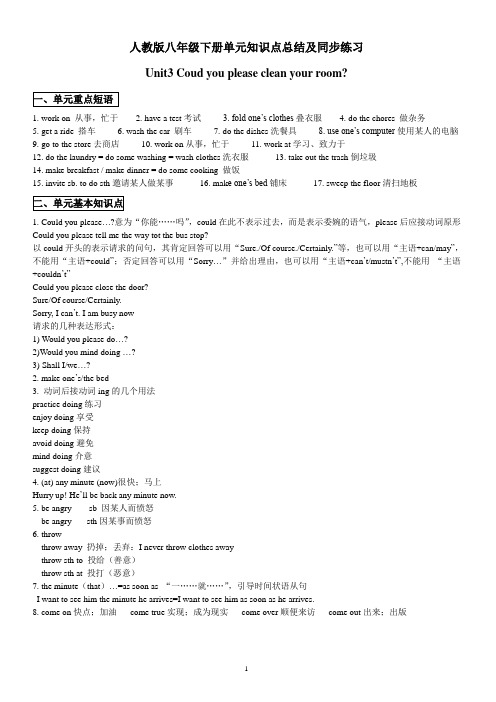
人教版八年级下册单元知识点总结及同步练习Unit3 Coud you please clean your room?1. work on 从事,忙于2. have a test考试3. fold one’s clothes叠衣服4. do the chores 做杂务5. get a ride 搭车6. wash the car 刷车7. do the dishes洗餐具8. use one’s computer使用某人的电脑9. go to the store去商店10. work on从事,忙于11. work at学习、致力于12. do the laundry = do some washing = wash clothes洗衣服13. take out the trash倒垃圾14. make breakfast / make dinner = do some cooking 做饭15. invite sb. to do sth邀请某人做某事16. mak e one’s bed铺床17. sweep the floor清扫地板1. Could you please…?意为“你能……吗”,could在此不表示过去,而是表示委婉的语气,please后应接动词原形Could you please tell me the way tot the bus stop?以could开头的表示请求的问句,其肯定回答可以用“Sure./Of course./Certainly.”等,也可以用“主语+can/may”,不能用“主语+could”;否定回答可以用“Sorry…”并给出理由,也可以用“主语+can’t/mustn’t”,不能用“主语+couldn’t”Could you please close the door?Sure/Of course/Certainly.Sorry, I can’t. I am busy now请求的几种表达形式:1) Would you please do…?2)Would you mind doing …?3) Shall I/we…?2. make one’s/the bed_________________3. 动词后接动词ing的几个用法practice doing练习enjoy doing享受keep doing保持avoid doing避免mind doing介意suggest doing建议4. (at) any minute (now)很快;马上Hurry up! He’ll be back any minute now.5. be angry ___ sb 因某人而愤怒be angry ___sth因某事而愤怒6. throwthrow away 扔掉;丢弃:I never throw clothes awaythrow sth to 投给(善意)throw sth at 投打(恶意)7. the minute(that)…=as soon as “一……就……”,引导时间状语从句I want to see him the minute he arrives=I want to see him as soon as he arrives.8. come on快点;加油come true实现;成为现实come over顺便来访come out出来;出版9. reply to sb/sth对某人/某物做出回答或反应10. all the time频繁;反复, 常常位于句末,强调在某段时间内一直进行或发生某事I have a dog and a cat, but they fight all the time.11. as…as…像……一样……表示两者在某方面程度相同,第一个as是副词,后应该跟形容词或副词的原级,第二个as是介词,后可跟名词,代词拓展:as…as…的否定形式是not as/so…as…“不如……;不与……一样”He studies as hard as his bother.He doesn’t study as/so hard as his brother12. neither1)neither did I 是“neither+be动词/助动词/情态动词+主语”结构,表示前者的否定情况也适用于后者。
2022年人教版七年级上册unit3---4单元复习知识点总结
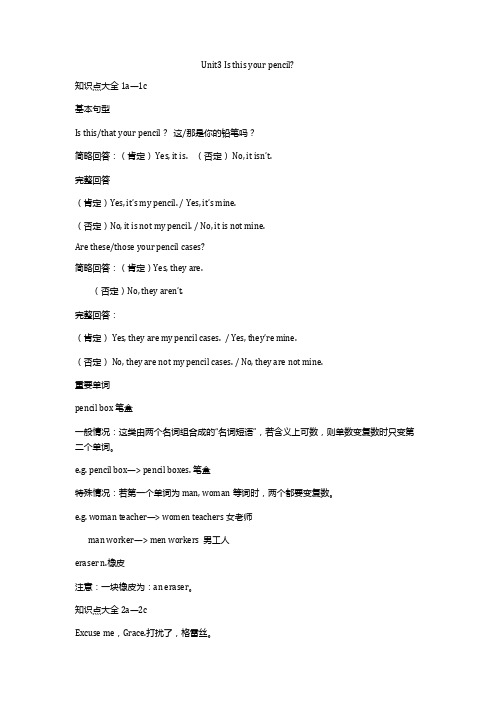
Unit3 Is this your pencil?知识点大全1a—1c基本句型Is this/that your pencil?这/那是你的铅笔吗?简略回答:(肯定) Yes, it is. (否定)No, it isn’t.完整回答(肯定)Yes, it’s my pencil. / Yes, it’s mine.(否定)No, it is not my pencil. / No, it is not mine.Are these/those your pencil cases?简略回答:(肯定)Yes, they are.(否定)No, they aren’t.完整回答:(肯定)Yes, they are my pencil cases. / Yes, they’re mine.(否定) No, they are not my pencil cases. / No, they are not mine.重要单词pencil box 笔盒一般情况:这类由两个名词组合成的“名词短语”,若含义上可数,则单数变复数时只变第二个单词。
e.g. pencil box—> pencil boxes. 笔盒特殊情况:若第一个单词为man, woman等词时,两个都要变复数。
e.g. woman teacher—> women teachers 女老师man worker—> men workers 男工人eraser n.橡皮注意:一块橡皮为:an eraser。
知识点大全2a—2cExcuse me,Grace.打扰了,格雷丝。
本句是向别人提出请求、询问事情或打扰别人时常用的交际用语。
e.g.Excuse me. How can I get to the hospital?请问,我可以怎么去医院呢?Excuse me. Is this your book?打扰了,这是你的书吗?补充:excuse me 与sorry的区别sorry一般用于对事后所犯的错误或者是不能满足对方的要求,不能帮助对方时表示歉意,常表示“对不起,不好意思”。
人教新目标高中英语必修四Unit3单元知识点归纳总结
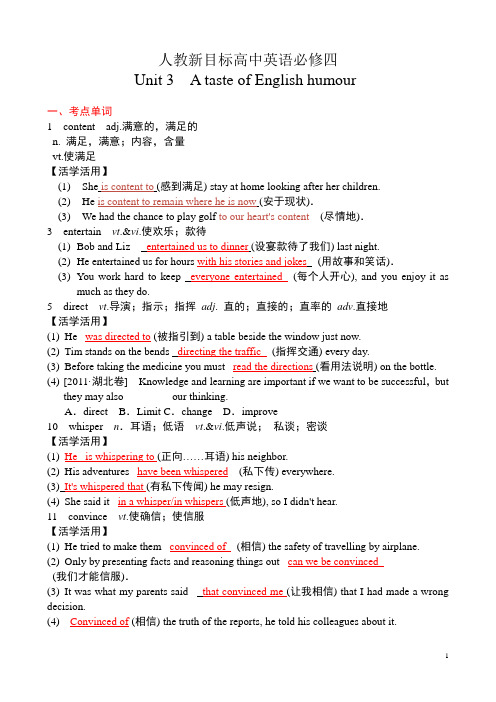
人教新目标高中英语必修四Unit 3 A taste of English humour一、考点单词1content adj.满意的,满足的n. 满足,满意;内容,含量vt.使满足【活学活用】(1) She is content to (感到满足) stay at home looking after her children.(2) He is content to remain where he is now (安于现状).(3) We had the chance to play golf to our heart's content _ (尽情地).3entertain vt.&vi.使欢乐;款待(1) Bob and Liz entertained us to dinner (设宴款待了我们) last night.(2) He entertained us for hours with his stories and jokes(用故事和笑话).(3) You work hard to keep _everyone entertained (每个人开心), and you enjoy it asmuch as they do.5direct vt.导演;指示;指挥adj. 直的;直接的;直率的adv.直接地【活学活用】(1) He _was directed to (被指引到) a table beside the window just now.(2) Tim stands on the bends _directing the traffic (指挥交通) every day.(3) Before taking the medicine you must _read the directions (看用法说明) on the bottle.(4) [2011·湖北卷] Knowledge and learning are important if we want to be successful,butthey may also ________ our thinking.A.direct B.Limit C.change D.improve10whisper n.耳语;低语vt.&vi.低声说;私谈;密谈【活学活用】(1) He _is whispering to (正向……耳语) his neighbor.(2) His adventures _have been whispered (私下传) everywhere.(3) It's whispered that (有私下传闻) he may resign.(4) She said it _in a whisper/in whispers (低声地), so I didn't hear.11convince vt.使确信;使信服【活学活用】(1) He tried to make them _convinced of (相信) the safety of travelling by airplane.(2) Only by presenting facts and reasoning things out _can we be convinced(我们才能信服).(3) It was what my parents said __that convinced me (让我相信) that I had made a wrong decision.(4) _Convinced of (相信) the truth of the reports, he told his colleagues about it.二、考点短语1badly off穷的;缺少的(比较级worse off, 最高级worst off)【活学活用】(1) Though he is always wearing old clothes, he is _not as/so badly off (并不是那么穷) as you think.(2) In fact most people are _better off (更富裕) than they were five yeas ago.3pick out(to choose or select)挑出;(distinguish)辨别出;领会(1) She __was/is picked out from thousands of applicants for the job.(2) We'll _pick up where we finished yesterday.(3) She soon _picked up French when she went to live in France.(4) Pick out those books that you'd like to read.4cut off(to shut off)切断(水、电、煤气等)供应;断绝用cut相关短语的适当形式完成句子(1) I was speaking to Ann on the phone when suddenly we were _cut off(2) The ship cut her way through the wave.(3) Cutting down costs is a good way to make profits.(4) Don't hesitate to cut out the useless information in your passage.三、考点句式1.(现在分词作结果状语常表示“意料、情理之中”,而不定式作结果状语常表出乎意料的结果)(1)She fell off the bike, breaking her left leg.(break)她从自行车上摔了下来,摔断了左腿(2)The old scientist died, leaving the project unfinished.(leave)那位老科学家去世了,留下了未完成的项目。
初三英语复习 unit3-4 review 单元重点词组语法汇总
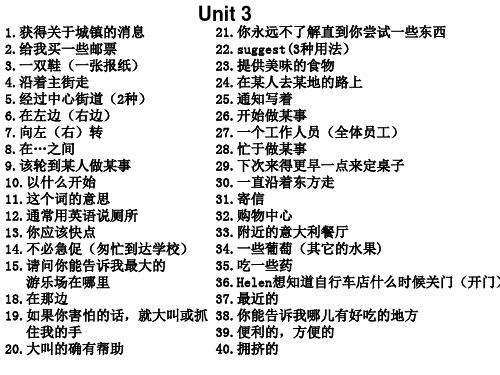
1.这是谁的排球? 这个排球属于谁? 2.喜欢兔子 3.他是野餐的时候惟一带帽子的男孩。 4.---这个发夹是谁的? ---它有可能是Mei的。或者它有可能 属 于 Linda.他们都有长头发。 5.你能告诉我我的自行车怎么了? 6.参加演唱会 7.一些贵重的东西 8.其余我的朋友 9.打电话个某人 10.每个人都有自己的想法。 11.没有什么曾经发生在这周围。 12.一件不同寻常的事情 13.奇怪的噪音(如此多的噪音) 14.我也不能看见其他的任何东西。 15.感到不安 16.在我们小区肯定有某个东西闯入我 们 家中。
32.许多年来,历史学家认为巨石 45.一个墓地 阵是一座古代领导人试图与神灵 46.一个尊敬祖先的地方 沟通的寺庙。 47.庆祝战胜敌人 33.许多世纪之前 48.很长的时期 34.达到 49.我们真的不知道谁建造了巨石阵。 35.指出 50.他们一定很勤奋。 36.一种日历 51.伟大的规划者 37.这些巨石以一种特定的方式被 52.没有那样的东西 放置在一起。 53.等待某人做某事 38.在盛夏的早晨,太阳直接照射 54.她是唯一穿那种色彩艳丽的衣服的 在石头的中心。 人. 39.一种医学目的 55.在电话里和谁聊天 40.预防疾病 56.在上班 41.使人们保持健康 57.谜团解开了 42.当你走到那儿时,你可以感觉 58.那道明亮的光 到能量从你的脚上传到你的身体。 59.给出一个选择 43.没有人确定巨石阵被用来干什么 60.表达一个结果 44.一种特殊的目的
Until 7
1.刚刚获得驾照 2.十六岁的青少年应该被允许打耳洞 3.担心你的安全 4.做兼职工作 5.选择自己的衣服 6.不够谨慎 7.太小而不能自己做决定 8.戒烟 9.Stop用法 10.戴耳环 11.剪头发 12.和朋友度过时光 13.需要时间做某事 14.对什么感到兴奋 15.选择某事 16.照很多照片 17.带来相机 18.保护油画 19.如果我们不用闪光灯的话,我们可能 被允许照相 20.无论如何,反正,尽管如此
新目标八年级英语上册第三单元知识点总结(Unit4Howdoyougettoschool?)

新目标八年级英语上册第三单元知识点总结(Unit 4 How doyou get to school? )Unit 4 How do you get to school?一.短语归纳1. take the subway to … = go to … by subway 搭地铁2. take the train to … = go to … by train 坐火车3. take a bus to … = go to …by bus = go to … on a bus 乘坐公共汽车4. take a taxi to … = go to … by taxi 坐的士5. ride a bike/ bicycle to… = go to … by bike/ bicycle 骑自行车6. walk to… = go to … on foot 步行7. take a car to… = go to … in a car= go to … by car 坐汽车8. get to school 到达学校get to=arrive in/at=reach 到达 (in加大地方at加小地方)9. 10 kilometers from school 离学校10公里(远)10. from…to… 从…到… from his home to school 从他家到学校11. how (用于提问状态和交通工具)怎样how long 用来询问时间的长度(用于提问时间段多长(时间))或物体的长度how often (用于提问频率)多久时间一次how far (用于提问距离)多远how many 用于提问数量)多少how much(用于提问数量/价钱)多少/多少钱how soon“过多久”,用来询问某事要在多久以后才能发生12. have a quick breakfast 快速地吃早餐13. leave for school 出发去学校14. the early bus 早班车15. take sb. to school 带某人去学校Then the early bus takes him to school.然后,他乘坐早班车到学校16. bus ride 搭公车的路程17. bus stop 公车亭18. bus station 公车站bus stop 是指小站,bus station指大的站,比如汽车站。
三年级英语上学期Unit3-4单元知识梳理(冀教版三起)

第三单元重点总结一.单词:*Fee l ings感觉:cold冷hot 热tired 疲倦的,累的happy 高兴的,幸福的sad悲伤的warm温暖的,暖和的cool 凉爽的,酷的*Body身体部位:head头arm胳膊hand手leg腿foot脚(复数feet) hair头发eye眼睛nose鼻子ear耳朵mouth嘴face脸shoulder肩膀stomach胃finger手指knee膝盖*动词:(熟记)touch 触摸clap 拍手stamp 跺脚wave 挥动shake 摇动walk走;步行*其他:left左边right右边doctor医生sick生病的hurt疼,受伤matter问题,事情(熟记) tail尾巴二.句型:1.询问感觉/他人健康状况(日常问候语):--How do you feel? 你感觉怎么样?--I feel _happy_. 我感觉... = I’m ____. = I am____.2.询问事物问答句:--What is it? 它是什么?--It is ____. 它是...3.T ouch your _____. 摸摸你的...4.c lap your hands 拍拍你的手stamp my foot 跺跺我的脚wave my arm 挥挥我的胳膊shake your leg 摇晃你的腿5.S how me your left _hand_. 向我展示你的左手。
Show me your right _____. 向我展示你的右...6.介绍人或物;描述事物特点句型:This is _____. 这是...That is _____.=That’s _____. 那是...(填hot/cold/warm/cool)7.询问别人健康状况(日常问候语):--Are you okay? 你还好吗?--No, I’m sick. 不,我生病了。
/ I’m fine. 我很好。
人教版中考英语一轮复习八年级上册Units3-4单元+短语汇总及比较级最高级
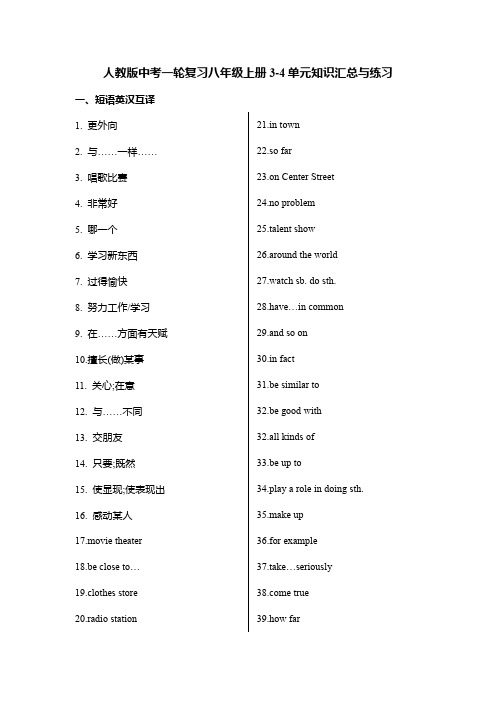
人教版中考一轮复习八年级上册3-4单元知识汇总与练习一、短语英汉互译1. 更外向2. 与……一样……3. 唱歌比赛4. 非常好5. 哪一个6. 学习新东西7. 过得愉快8. 努力工作/学习9. 在……方面有天赋10.擅长(做)某事11. 关心;在意12. 与……不同13. 交朋友14. 只要;既然15. 使显现;使表现出16. 感动某人17.movie theater18.be close to…19.clothes store20.radio station 21.in town22.so far23.on Center Street24.no problem25.talent show26.around the world27.watch sb. do sth.28.have…in common29.and so on30.in fact31.be similar to32.be good with32.all kinds of33.be up to34.play a role in doing sth.35.make up36.for example37.take…seriouslye true39.how far二、形容词副词原级比较级最高级1.serious more serious most serious2.outgoing more outgoing most outgoing3.clearly more clearly most clearly4.close closer closestfortable more comfortable most comfortable6.creative more creative most creative7.crowded more crowded most crowded8.beautifully more beautifully most beautifully练习一、单项选择1.What do you ____ this new watch?A.think at B.think of C.think over D.think hard 2.—How often do you chat online at home?—________. I don't think it's good for me.A.Always B.Usually C.Sometimes D.Hardly ever 3.My father is ________ of my parents, but I am ________ in my family.A.heavier; the heaviest B.more heavy; most heavy C.the heavier; the heaviest D.the most heavy; heaviest 4.May I have a talk with you? I have _______ to tell you.A.nothing important B.anything importantC.something important D.important something 5.—Who is the_____________ runner, Mike or Sam?—Mike is. He is good at running.A.faster B.slower C.weaker 6.Which would you like ________, basketball or football?A.good B.better C.best D.well7.Amy makes ________ mistakes than Frank. She does her homework ________. A.less; more carelessly B.fewer; more carelesslyC.less; more carefully D.fewer; more carefully8.He always finished his work better with ________ money and ________ people. A.less; fewer B.fewer; less C.little; less D.less; few9.________ friends you have, ________ you will be.A.More;happier B.The more;the happyC.More;more happy D.The more;the happier10.The less junk food you eat, _______ you will be.A.the healthier B.healthier C.more healthy二、根据短文内容及所给提示,在文中的空白处写出单词的正确形式。
【三升四】 人教PEP 三下英语复习Unit 3--4(梳理+基础卷+提高卷)(含答案)

名校暑假培优人教PEP三升四复习三下Unit 3—4知识梳理Unit3At the zoo一、词汇thin 瘦的fat 胖的;肥的tall 高的short 矮的;短的long 长的small 小的big 大的giraffe 长颈鹿so 这么;那么children (child的复数)儿童tail 尾巴二、句子1. Look at the elephant. 看这头大象。
2. It has a long nose. 它有长鼻子。
3. Look at that monkey. It’s so fat! 看那只猴子。
它好胖啊!4. Look at the giraffe. 看这只长颈鹿。
5. It’s so tall! 它好高啊!6. It’s short and fat! 他又矮又胖!7. It has a short tail. 它有短尾巴。
8. It has small eyes and big ears. 它有小眼睛和大耳朵。
9. It has a small head! 它有小头!三、句型结构1. It’s (so) +描述外形特征的形容词.e.g.: It’s so small. 它太小了。
2. It has+描述外形特征的短语.e.g.: It has a long body and short legs. 它有长身体和短腿。
Unit4Where is my cat?一、词汇on 在……上in 在……里under 在……下面chair 椅子desk 书桌cap 帽子ball 球car 小汽车 boat 小船map 地图toy 玩具box 盒;箱二、句子1. Where is my car? 我的小汽车在哪里?2. -- Where is my pencil box? 我的铅笔盒在哪里? -- It’s in your desk. 它在你的书桌里。
3. It’s under your book! 它在你的书下面!4. -- Where is the ruler? 尺子在哪里?-- It’s under the chair! 它在椅子下面!5. Where is my cap? 我的帽子在哪里?6. -- Is it in your bag? 它在你的包里吗?-- No, it isn’t. 不,它不在。
人教版九年级全一册英语Unit3单元语法知识点总结
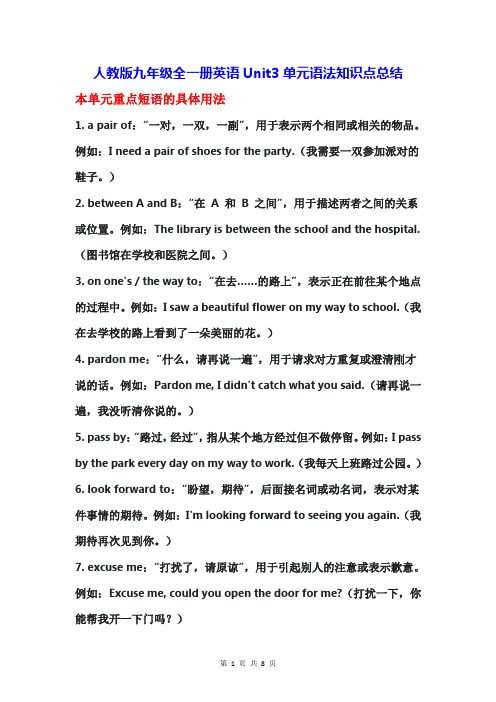
人教版九年级全一册英语Unit3单元语法知识点总结本单元重点短语的具体用法1. a pair of:“一对,一双,一副”,用于表示两个相同或相关的物品。
例如:I need a pair of shoes for the party.(我需要一双参加派对的鞋子。
)2. between A and B:“在A 和B 之间”,用于描述两者之间的关系或位置。
例如:The library is between the school and the hospital.(图书馆在学校和医院之间。
)3. on one's / the way to:“在去……的路上”,表示正在前往某个地点的过程中。
例如:I saw a beautiful flower on my way to school.(我在去学校的路上看到了一朵美丽的花。
)4. pardon me:“什么,请再说一遍”,用于请求对方重复或澄清刚才说的话。
例如:Pardon me, I didn't catch what you said.(请再说一遍,我没听清你说的。
)5. pass by:“路过,经过”,指从某个地方经过但不做停留。
例如:I pass by the park every day on my way to work.(我每天上班路过公园。
)6. look forward to:“盼望,期待”,后面接名词或动名词,表示对某件事情的期待。
例如:I'm looking forward to seeing you again.(我期待再次见到你。
)7. excuse me:“打扰了,请原谅”,用于引起别人的注意或表示歉意。
例如:Excuse me, could you open the door for me?(打扰一下,你能帮我开一下门吗?)8. get some information about:“获取有关……的一些信息”,用于表示获取关于某个主题的信息。
人教版七年级英语下册Unit3_单元要点梳理总结

Unit3 单元要点梳理总结重点短语1.学校旅行school trip2.去散步go for a walk3.挤牛奶milk a cow4.骑马ride a horse5.喂鸡feed chickens6.与农民交谈talk with a farmer7.照相take photos 8.问一些问题ask some questions9.种苹果grow apples 10.带某人逛/参观某地show sb. around11.学到许多learn a lot 12.摘草莓pick some strawberries13.上周last week 14.在乡村in the countrysidevisit my grandparents 16.去钓鱼go fishing15.拜访我的祖父母17.去爬山climb the mountains 18.参观博物馆visit a museum19. 画画draw pictures 20.去学校旅行go on a school trip21.礼品店gift shop 22.为某人买某物buy sth for sb.23.总得来说all in all 24.对……感兴趣be interested in...25.一点儿也不not...at all重点句型1.你见到奶牛了吗?Did you see any cows?2.我见到了而且见到了很多很多。
Yes, I did. I saw quite a lot.3.卡罗尔拍照片了吗?Did Carol take any photos?4.是的,她拍了。
Yes, she did.5.你好,Eric,上周旅游怎么样?Hi, Eric, How was your trip last week?6.精彩极了,我还去乡下看望了爷爷奶奶。
It was excellent. I visited my grandparents in thecountryside.7.我们玩得非常开心!We had so much fun!8.我也拍了好多精彩照片。
译林牛津版九年级英语下册Unit 3-4单元词句梳理
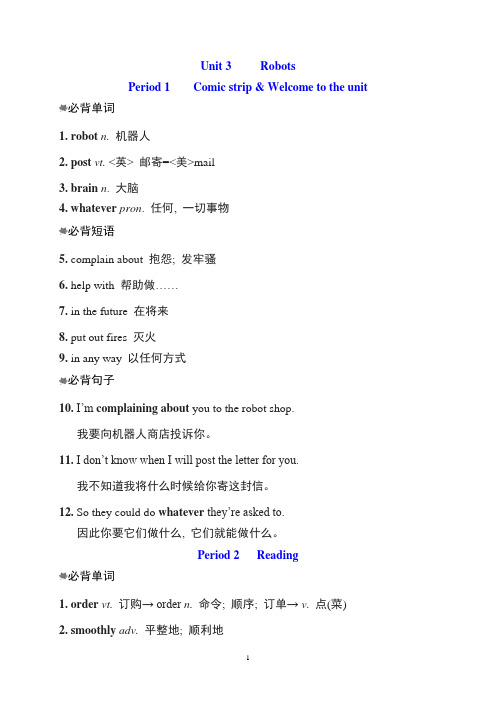
Unit 3 RobotsPeriod 1 Comic strip & Welcome to the unit 必背单词1. robot n.机器人2. post vt. <英> 邮寄=<美>mail3. brain n. 大脑4. whatever pron. 任何, 一切事物必背短语5. complain about 抱怨; 发牢骚6. help with 帮助做……7. in the future 在将来8. put out fires 灭火9. in any way 以任何方式必背句子10. I’m complaining about you to the robot shop.我要向机器人商店投诉你。
11. I don’t know when I will post the letter for you.我不知道我将什么时候给你寄这封信。
12. So they could do whatever they’re asked to.因此你要它们做什么, 它们就能做什么。
Period 2 Reading必背单词1. order vt.订购→ order n.命令; 顺序; 订单→ v. 点(菜)2. smoothly adv. 平整地; 顺利地→ smooth adj.顺利的; 光滑的; 平稳的3. satisfy vt.满足, 使……满意→ satisfied adj.感到满意的4. need n. 需要的事物; 欲望→ need v. 需要; 必需modal. v. 需要, 必须(无人称或数的变化, 后接动词原形, 多用于疑问句和否定句中)5. properly adv. 正确地, 适当地→ proper adj. 合适的; 正当的; 真正的6. complete adj. 完全的, 彻底的→ completely adv. 完全地; 十分地; 全然7. mess n. 乱七八糟8. lay vt. 放, 搁9. store vt. 储藏, 存储10. coin n. 硬币11. bill n.账单12. private adj. 私人的13. paper n. 文件, 证明14. spread vt. & vi.(使) 散开; 扩散15. wheel n. 轮子, 车轮必背短语16. order one from a robot shop从机器人商店订购一个17. as well 也18. look as good as new看上去几乎和新的一样19. tidy up 整理; 收拾20. in general 总的来说; 大体上21. go wrong 出错22. no longer 不再23. make mistakes 犯错24. in a complete mess 一团糟25. knock over 打翻; 撞倒26. in the end 终于; 最后必背句子27. He is always too busy to have any time to relax.他总是太忙, 没有时间放松。
牛津译林版八年级上册英语Unit 3-Unit 4单元知识点总结

Unit 31. You need to exercise and keep fit.你需要锻炼并保持健康。
(1) need 在句中作实义动词,意为“需要;有必要”,除直接接宾语外,还常后跟不定式的结构,固定结构 need sb. to do sth.意为“需要某人做某事“。
如:Now, I need you to listen to me carefully. 注:作实义动词时,疑问式为 do you need…?,否定式为 you don’t need…。
如:Do you need any help? No, we don’t.(2) 作情态动词时,后接动词原形,多用在疑问句、否定句中或条件句中。
疑问式中为need you…?,否定式中为needn’t…。
如:Need he go so soon? 他这么快就要走吗?—He needn’t . 他不必走。
/—Yes, he must. 是的,他必须走。
If she wants anything, she need only ask. 她想要什么东西,只要开一下口就行了。
(3) exercise 作名词时,如泛指“练习;锻炼”的抽象概念时不可数,如:morning exercises 早操;如若表示有完整一套动作的“锻炼;练习”则可数,且多用复数形式,如:do exercise 锻炼。
(4)keep fit=keep healthy,意为“保持健康”,此处 keep 为系动词,表示保持或继续某种状态,后跟形容词 fit 构成系表结构。
e on 意为“来吧;快点儿”表示催促,如:Come on! The bus is leaving.此外,come on 还可表示“挑战;命令;恳求;激励别人”等。
如:Come on Doreen, let’s dance. 来吧,多琳,我们跳舞吧。
3. Let’s enjoy ourselves!让我们尽情享受吧!(1)Let’s…的否定形式为Let’s not….(2)enjoy oneself 意为“玩得愉快”,相当于 have a good time。
人教版英语八年级上册Unit 3-Unit 4【复习课件】2023年中考英语一轮大单元复习(人教版)

6.waste v.浪费;滥用 n.浪费;垃圾 例:You are wasting your time in trying to explain it to him.你跟他解 释是在浪费时间。(v.) Water pollution is caused by waste from factories and cities.水污染是 由工厂和城市排放的废弃物引起的。(n.)
上一页 返回导航 下一页
3.clear adj.清楚易懂的;晴朗的 v.清理;清除 例:It was quite clear to me that she was lying.我非常清楚她在撒谎。 (adj.) I had cleared my desk before I left.离开之前我清理干净了我的书桌。 (v.)
13.make sb.do sth. 使某人做某事 14.in order to 目的是;为了 15.为某人提供某物 provide sth.for sb. 16.依靠;信赖 depend on 17.照顾;处理 take care of 18.允许某人做某事 allow sb.to do sth.
上一页 返回导航 下一页
18.抄袭;模仿;复制;复印(v.) copy 19.归还;回来;返回(v.) return 20.成员;分子(n.) member 21.技艺;技巧(n.) skill 22.造成;引起(v.) cause 23.鞭策;督促;推动(v.) push
上一页 返回导航 下一页
上一页 返回导航 下一页
pete(v.)→ competition (n.)竞争;对抗 10.ill(adj.)→ illness (n.)疾病;病 11.lend(v.)→ lent (过去式/过去分词)借给;借出 ual(adj.)→ unusual (反义词)特别的;不寻常的
初三英语(unit3-unit4)知识点总结

初三英语(unit3-unit4)单元知识总结Topics:Teenagers should be allowed to choose their own clothes.What would you do?重点词汇精讲1.allow sb. to do sth. 允许某人做某事Mother allows me to watch TV every night.be allowed to do sth. 被允许做某事LiLy is allowed to go to Qinzhou.2.get their ears pierced 穿耳洞get sth. done = have sth. done让/使(别人)做某事I get my car made. = I have my car made. 我让别人修好我的车3.enough 足够形容词+beautiful enoughenoughenough+名词enough foodenough to do… 足够…去做…I have enough money to go to Beijing.She is old enough to go to school.4.sb. seem to do sth.看起来好像…He seems to feel very sad.It seems that +从句It seems that he feels very sad.5.be strict with sb. 对某人严厉Mother is strict with her son.6.keep sb./sth. +形容词 使某人/某物保持….We should keep our city clean.7.have an opportunity to do sth. 有机会做某事have a chance of doing sth. 有机会做某事I have an opportunity to go to Beijing.I have a chance of going to Beijing.8.have +时间段+off 放假,休息We will have 2 days off.9.get in the way of 碍事,妨碍Her social life got in the way of her studies.10.think about 与think of 的区别①当两者译为:认为、想起、记着时,两者可互用I often think about/ of that day.②think about 还有“考虑”之意,think of 想到、想出时两者不能互用At last, he thought of a good idea.We are thinking about going Qinzhou.11.对… 热衷,对…兴趣be serious about doing sth./sthShe is serious about playing computer games/games. 12.practice doing 练习做某事She often practice speaking English.13.care about sb. 关心某人Mother often care about her son.14.a few 与a little 的区别,few 与little 的区别⑴a few 一些修饰可数名词a little 一些修饰不可数名词两者表肯定意义He has a few friends. T here is a little sugar in the bottle.⑵few 少数的修饰可数名词little 少数的 修饰不可数名词两者表否定意义He has few friends. There is little sugar in the bottle. 15.what if +从句如果…怎么办,要是… 又怎么样What if she doesn’t come? 要是她不来怎么办?What if LiLei knows? 如果李雷知道了怎么办?16.add sth. to sth. 添加…到…I added some sugar to water.17.help sb. do sth./ to do sth./with sth.They help with this problem.They help you relax/ to relax.18.introduce sb. to sb. 把某人介绍给某人I introduced Lily to Anna.19.invite sb. to do 邀请某人做某事Lily invited me to go to her home for supper. 20.introduce sb. to sb. 把某人介绍给某人I introduced Lily to Anna.21.invite sb. to do 邀请某人做某事Lily invited me to go to her home for supper.22.let sb. down 让某人失望Don’t let your mother down.23.come up with sth. 提出想出He came up with a good idea.24.have experience doing 在做某事有经验I have experience teaching Chinese.25.come out 出版,出来The magazine comes out once a week.26.by accident 偶然地,无意之中Last week I cut my finger by accident.27.plenty of 修饰不可数名词,也可以修饰可数名词,许多They have plenty of food/ apples.课文难点解析1.I don’t think twelve-year-olds should be allowed to get their ears pierced.我认为不应该允许12岁的孩子穿耳孔.2.They talk instead of doing homework.他们聊天而不是做作业.3.Only then will I have a chance of achieving my dream.只有这样我才能实现我的梦想.4.They should be allowed to practice their hobbies as much as they want.应该允许他们对业余爱好想练多长时间就练多长时间.5.We have nothing against running.我们没有理由反对他跑步.6.He doesn’t know if he should bring a present.他不知道是否该带礼物。
人教版八年级上册Unit3-4单元知识点总结
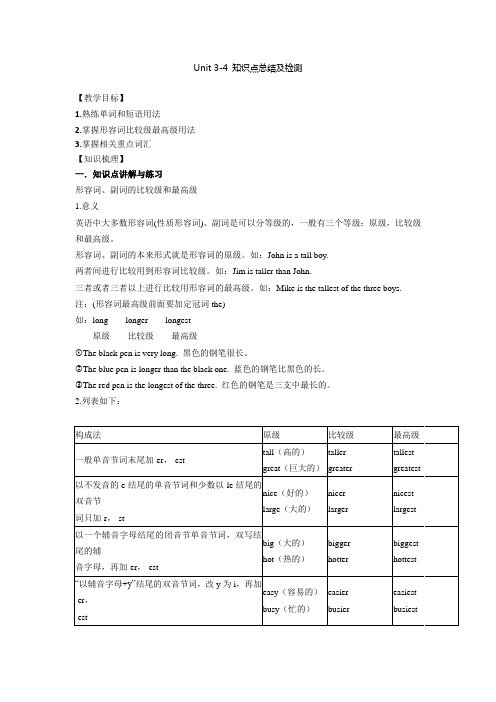
Unit 3-4 知识点总结及检测【教学目标】1.熟练单词和短语用法2.掌握形容词比较级最高级用法3.掌握相关重点词汇【知识梳理】一.知识点讲解与练习形容词、副词的比较级和最高级1.意义英语中大多数形容词(性质形容词)、副词是可以分等级的,一般有三个等级:原级,比较级和最高级。
形容词、副词的本来形式就是形容词的原级。
如:John is a tall boy.两者间进行比较用到形容词比较级。
如:Jim is taller than John.三者或者三者以上进行比较用形容词的最高级。
如:Mike is the tallest of the three boys. 注:(形容词最高级前面要加定冠词the)如:long longer longest原级比较级最高级①The black pen is very long. 黑色的钢笔很长。
②The blue pen is longer than the black one. 蓝色的钢笔比黑色的长。
③The red pen is the longest of the three. 红色的钢笔是三支中最长的。
2.列表如下:不规则变化:6)有少数形容词、副词的比较级和最高级是不规则的,必须熟记。
列表如下:形容词最高级的用法1. 形容词的最高级用于三者或三者以上的人或事物的比较,其中有一个在某一方面超过其他几个。
如:Monday is the busiest day for us. 对我们来说,星期一是最忙碌的日子。
Judy runs most quickly of the four girls. 在四个女孩中,朱迪跑得最快。
2. 使用形容词最高级时,句中往往会出现由in或of构成的介词短语,用以说明范围。
in表示在某一范围内,of表示属性,意为“某一类中的”。
of 表示比较的对象属于同一范畴;in 则表示不属于同一范畴。
如:John is the heaviest of all. 约翰是所有人中最重的。
人教八年级上册英语Unit3---4单元重点短语

Unit3 I'm more outgoing than my sister. 【重点短语】1. more outgoing 更外向;更开朗】more hard-working 更勤奋的2. as 形容词/副词原形as... 与…… 一样……as hard as 与…..一样努力3. not as/so…as… …..不如……4. the most important 最重要的5. be talented in music 在音乐方面有天赋have a talent for 有……的天赋6. the same as 和……相同;与……一致7. care about 关心;在意care for 照顾;非常喜欢be careful 当心;小心take care 当心;小心=look outtake care of 照顾= look after8. be different from 与…...不同9. be like a mirror 像一面镜子10. as long as 只要;既然;与…...一样长11. bring out 使显现;使表现出;出版,生产12. get better grades 取得更好的成绩have good grades 有良好的成绩13. reach for 伸手达到/达到reach for one’s hand 伸手帮某人一把14. reach= get to =arrive at/in 到达15. in fact 事实上16. make friends (with sb.)(和……)交朋be make friends 成为朋友17. be good at 擅长…… =do well in18. the other 另一个19. be similar to 与……相像的、类似的20. be similar in 在某方面相似21. both …and … …..和……都22. play the drums 敲鼓23.be there 随叫随到;不离……左右24. work hard 工作努力hard work 辛苦的工作25. a good listener 善于倾听26. the singing competition 歌咏比赛27. be good with 善于应付……的;与…和睦相处28. touch one’s heart 感动某人29. break one’s 身体部位摔断…的……30. talk about 谈论;讨论31. share sth. with sb. 和…..分享某物32. long straight hair 长直发33. primary school student 小学生34. call …at….. 拔打……找某人35 more information 更多的信息36. get the job 得到这份工作【用法】:1. want to do sth.would like to do sth.feel like doing sth. 想要做某事2. make sb. do 让某人做……Let sb. do sth.3. That’s why… 那就是……的原因4. It’s adj. for sb. to do sth. 对某人来说做某事是……5.enjoy doing sth. 喜欢做某事6. A be 形容词比较级than B A比B……7. A 实义动词副词比较级than B8. 比较级and 比较级越来越……9. the 比较级,the 比较级越……,越……10. 疑问词be/ 动词Unit4 What's the best movie theater?【重点短语】1. the movie theater 电影院2. big screen 大屏幕3. comfortable seats 舒服的座位4. the best sound 最好的音效5. the shortest waiting time 最短的等待时间6. buy tickets the most quickly 买票最快7. radio station 广播电台8. in town 在镇上;在城里9. more and more popular 越来越受欢迎10. so far 到目前为止,迄今为止11. On Center Street 在中心街12. the freshest food /air 最新鲜的食物/空气13. a movie ticket 一张电影票14. no problem 没什么; 别客气15. the worst service 最差的服务16. pretty bad 相当糟糕17. only 10 dishes 只有10道菜18. not… at all 根本不,一点儿也不19. a meal 一顿饭20. 10 minutes by bus 乘公共汽车10分钟的路程21. be close to 离..….近22. how much/ how many /how long /how far /how often /how soon多少(钱)/多少/多长(时间)/多远/多久一次/多久23. the most creative 最有创造性的24. show one’s talents 展示……才艺25. talent show 才艺展示,才艺表演26. more and more 越来越多27. around the world28. all over the world 全世界;世界各地29. have….in common 有相同特征;(想法、兴趣等方面)相同30. try to do 尽力做……31.try doing 试着做……32.look for 寻找find out 弄清;查明33. the best performer 最好的表演者34.the most talented person 最有才的人35.the most exciting magicians 最激动人心的魔术师36.the funniest actors 最滑稽的演员37. all kinds of 各种各样38. a kind of 一种39. different kinds of 不同种类40. be up to 由…...决定;是…...的职责41. play a role 发挥作用;有影响42. get a very good prize 获得到丰厚的奖品43. not everybody 并不是每个人44. enjoy n. / pron. /v. ing 喜欢……45. the lives of the performers 表演者的生活46. make up 编造(故事、谎言等);化妆47. take …..seriously 认真对待……48. and so on 等等49. come true 实现50. in fact 事实上51. make sb. do sth. 让某人做……52. the best chess player 最好的棋手53. on Saturdays 在星期六54. sing the most beautifully 唱歌最动听55. the street performers 街头艺人56. take walks 散步57. school talent show 学校才艺表演58. an excellent sports center 一个优秀的运动中心59. for example= such as 例如60. get to = arrive at/in = reach 到达【用法】:1. Can I ask you some… ?我能问你一些……吗?2. What do you think of/about…?=How do you like…?= How do you feelabout…?你认为……怎么样?3. Thanks for n. / pron. / v.ing = Thank you for n. / pron. / v.ing因……而感谢4. much+ 形容词/副词的比较级……得多5. watch sb. do sth. 观看某人做了某事watch sb. doing sth. 观看某人正在做某事6. be up to sb. to do sth 应由某人做某事That’s up to sb. to do sth. 做某事是某人的职责。
Unit3Unit4大单元教学单元分析课件教新目标英语八年级上册
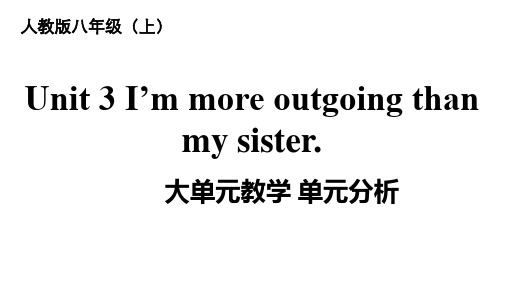
促使学生思考自己的个性、能力和 学习习惯,形成正确的自我认知, 同时引导学生尊重个体差异、正确 地认识他人。
引导学生理解不同的人对同一件事 可能有不同的主观看法,让学生学 会接纳和尊重不同的观点。
Section B 1c-1d
你认为朋友应该相同还是不同?写一篇短文来表达你的观点吧!
Mary, Jim和Jenny分别写电子邮件寻找网友。你会选择谁做朋友呢? 读一读他们的电子邮件,并给出理由!(提示:比较性格和兴趣爱 好再做选择) 你有动物朋友吗?能分享一个你和动物之间的故事吗?如果你没有 动物朋友,能分享一个你曾经听过的相关故事吗? 你(或故事的主人公)从这个故事中获得了什么?
* Grammar in Context是嵌入语法的阅读,不与单元主题相关
课时 Lesson 1 Lesson 2 Lesson 3 Lesson 4
Lesson 5
作业设计
作业
写一小段话去比较你和你的好朋友在外貌、性格、兴趣和习惯上的 差异。
除了外貌、兴趣、性格,你和你的朋友还有哪些相似和不同?尝试 从未来计划、社交圈、社交活动等方面作比较吧!
Tina更聪明。两姐妹互相尊 异,不过分自恋或贬低他人。 3. 对话采用了自然的口语化语言,
重差异,同时也在一些品 质和习惯上有不同看法,
以对比和比较为主题,通过第三方 观察者引导对话,同时也融入了一 些情感元素,使对话更具生动和亲
如懒惰和早起。
近感。
语篇
What
Why
Section A 2d (对话)
Why
突出友情的重要性,强调朋 友可以在生活中扮演鼓励者 和支持者的角色,鼓励年轻 人在朋友之间建立相互支持 的关系。同时,引导学生对 什么是友谊进行思考,从而 树立正确的交友观。
人教版初中英语新教材七年级上Unit3知识点归纳总结(复习必背)

Unit 3 My school!学习目标单元主题人与自我→生活与学习→多彩、安全、有意义的学校生活必备单词Section A1.hall/hɔ:l/n.礼堂;大厅2.building/'bɪldɪŋ/n.建筑物;房子3. across/ə'krɒs/prep&adv.过;穿过4.gym/dʒm/n.(=gymnasium) 体育馆,健身房;(尤指学校的)体育活动5.field/fi:ld/n.场地;田地6.office/'ɒfɪs/n.办公室7.large/la:dʒ/adj.大的;大号的8.special/'speʃl/adj.特别的;特殊的9.smart/sma:t/adj.智能的;聪明的10.whiteboard/'waɪtbɔ:d/n.白板;白色书写板11.important/ɪm'pɔ:tnt/j.重要的12.notice/'nəutɪs/n.通知;注意v.注意到;意识到13.locker/'lɒkə(r)/n.有锁存物柜;寄物柜14.drawer/drɔ:(r)/n.抽屉15.corner/'kɔ:nə(r)/n.角;墙角;街角16.bookcase /'bʊkkeɪs/n.书架;书柜17.screen/skri:n/n.屏幕;银幕1.modern/'mɒdn/adj.现代的;当代的2.amazing /ə'meɪzɪŋ/adj.令人惊奇(惊喜或惊叹)的3.raise/reɪz/v.使升高;提高4.flag/flæg/n.旗;旗帜5.most/məust/adj.&pron.大多数;最多;最大adv.最6.change /tʃeɪndʒ/v.&n.改变;变化Section B 7.seat/si:t/n.座位8.delicious/dɪ'lɪʃəs/adj.美味的;可口的9.yours/jɔ:z/pron.(通常写作Yours,用于书信结尾的签名前)你的;10.send/send/v.发送;邮寄11.similar/'sımələ(r)/adj.类似的;相像的12.sound/saund/v.听起来;好像n.声音;响声高频短语1.dining hall 餐厅10.at school在学校2.in front of在······前面11.different from与······不一样3.next to 紧邻;在······近旁12.do exercises做体操4.across from在对面13.change seats 换座位5.sports field运动场14.similar to类似的;相像的6.put up张贴;搭建15.sounds fun 听起来有趣7.desk drawer 书桌抽屉16.tell sb about sth 告诉某人关于某事8.at the back(of)在(······)后面17.bye for now再见9.reading corner 阅读角18.most of...···的大多数/大部分常考句型1.表示“问路”与“指路”的句型:-Where's the dining hall?餐厅在哪里?-It's in front of the art building.它在艺术大楼的前面。
人教七年级下册 Unit 3 --4语法精讲

Unit 3 How do you get to school?Section A单元语法1:交通方式的英语表达英语中的交通方式的表达法主要有两种:介词表达法和动词表达法。
(1)动词表达法①“动词+ 限定词+ 表示交通工具的名词”take a/the/ sb.’sdrive a/the/sb.’s bus/ car/ taxi/ to sp. 乘/驾驶...去某地特殊:骑自行车用ride,不同takeride a/the/sb.’s bike to sp. = go to sp. by bike(骑自行车去某地)Eg: He often takes a train to Shanghai. 他经常坐火车去上海。
Linda usually rides a bike to school.②“动词+ to+ 地点名词”= get/go to sp. by +交通工具常用动词有:fly, drive, ride, walk 等。
(若sp为地点副词home/ here/ there时,则省去to )fly to sp. = take the plane to sp. = go to sp. by air/planedrive to sp.= take the car to sp. = go to sp. by car/bus/taxiride to sp. = ride the bike to sp. = go to sp. by bikewalk to sp. = go to sp. on foot【动词表示法总结】动词表示法2种分类表示中,常用的表示方法为:take+限定词+交通工具(两个特殊:①walk to ...= on foot ②ride the bike = ride to... = by bike)(2)介词表达法①“by +表示交通工具的单数名词”表示交通工具的名词只能用单数,且不能被冠词或物主代词修饰。
人教版八年级下英语Unit 3 --4单元知识总结

Unit 3Could you please clean your room?重点词汇重点短语Section A 1.do the dishes 洗餐具2.take out the rubbish 倒垃圾3.fold the clothes 叠衣服4.sweep the floor 扫地5.make the bed 铺床6.clean the living room 打扫起居室7.get a ride 搭顺风车8.work on 从事;创作;操作9.help out 帮助做完某事10.at least 至少11.finish doing sth.做完某事12.in a mess 乱七八糟13.throw down 扔下14.sit down 坐下15.take the dog for a walk 遛狗16.all the time 频繁;反复17.as...as...和……一样……18.in surprise 惊讶地;吃惊地19.as soon as 一……就……20.pass sb.sth.=pass sth.to sb.把某物递给某人21.borrow sth.from sb.从某人处借某物22.lend sth.to sb.把某物借给某人23.hate doing/to do sth.厌恶做某事Section B24.invite sb.to...邀请某人到……25.make sb.do sth.让/使某人做某事26.a waste of time 浪费时间27.spend time on sth.在某方面花时间28.in order to 目的是;为了29.get good grades 取得好成绩30.provide sth.for sb.=provide sb.with sth.给某人提供某物31.mind doing sth.介意做某事32.depend on 依赖;依靠;取决于33.do one's part in doing sth.尽某人的职责做某事34.have no idea 不知道35.as a result 结果36.look after=take care of 照顾37.fall ill 生病重点句型1.Neither+be动词/情态动词/助动词+主语……也不。
- 1、下载文档前请自行甄别文档内容的完整性,平台不提供额外的编辑、内容补充、找答案等附加服务。
- 2、"仅部分预览"的文档,不可在线预览部分如存在完整性等问题,可反馈申请退款(可完整预览的文档不适用该条件!)。
- 3、如文档侵犯您的权益,请联系客服反馈,我们会尽快为您处理(人工客服工作时间:9:00-18:30)。
Unit3-4 总结【句型】1.①like/love/enjoy/be fond of doing 喜欢做某事。
(enjoy s/enjoy ed)hate doing sth. 讨厌做某事。
(比较:feel like doing sth. = would like to do sth. 想要做某事。
)②be interested in doing sth. 对做某事感兴趣。
(interesting 有趣的interest 兴趣n.)③prefer doing sth. to doing sth. 比起……更喜欢……(to表介词的标志) (prefer s/prefer red)2.①sb. spend + 时间/钱+ (in) doing sth. 某人花多少时间/钱做某事。
(spen t)②It takes sb. + 时间+to do sth. 某人花多少时间做某事。
(t oo k)③It costs sb. +钱+ to do sth. 某人花多少钱做某事。
(cost)3. pay attention to doing 注意做某事。
(to表介词的标志)4.①find great pleasure (in)doing sth. 发现做某事有很大的乐趣。
②sb. have great fun doing sth. 做某事很愉快。
③It’s great fun (for sb.) to do sth. 做某事(对某人来说)有很大乐趣。
5. lose oneself in doing sth. 沉迷于做某事。
(lost)6.do some doing sth. e.g. do some shopping/ cleaning/ washing 购物/做卫生/洗衣服7.without doing sth. 没做某事without leaving your home/having breakfast/saying a word8.There be + n. + Ving9.would you mind (not)doing sth. 你介意(不)做某事吗?10.keep (sb.)doing sth. (让某人)保持做某事make sb. do sth 使某人做某事ask/tell/ advise/ order sb. to do sth.e d to do sth./ didn’t use to do sth. 过去常常做某事/过去不经常做某事use sth. to do sth. / for doing sth.. 用某物做某事(*比较:be use d to do sth. 被用于做某事be /get use d to do ing sth. 习惯做某事)12. order sb. (not) to do sth. 命令某人(不要)做某事13. continue doing/to do sth. 继续做某事(比较*go on doing sth. 继续做同一件事go on to do 继续去做另一件事)(*stop to do sth 停下来去做另一件事stop doing sth. 停止做某事)14. afford to do sth. 付得起做某事15. agree (sb.) to do sth. 同意(某人)做某事16. call sb. to do sth. 打电话叫某人做某事17.find/think it + adj. (for sb.) to do sth. 发现/认为做某事(对某人来说)是…….18.take the place of sb. to do sth. = do sth. instead of sb. 代替某人做某事instead of doing sth. 代替做某事19.how to do sth. 如何做某事20.teach sb. to do sth. 教某人做某事(taught)learn to do sth. 学做某事21.need sth. to do sth. 需要某物来做某事22.to do 表目的23.try to do sth. = try/ do one’s best to do sth. 尽力做某事try doing sth. 尝试做某事24. be sure to do sth. 确定做某事25. get to do sth.26. sb. be welcome to do 欢迎某人做某事27. I think + doing sth. + Vs …(动名词充当主语)【重点】(一)过去进行时1. 时间状语具体时间点/一段时间+过去时间(e.g. at that time/ at 7 o’clock yesterday/ from 3 o’clock to 5 o’clock lastnight/ at this time last Sunday)2. 构成:was/were (not)do ing疑问句:Was/were sb. doing sth.? ( I/ he / she/ it was we/you/they were)3. when & while(1)短暂性动词用一般现在时或一般过去式,延续性动词用现在进行时或过去进行时(常见短暂性动词:come, go, enter, get, arrive, leave, ring, knock, see, find, wake up ...)(2) while + 延续性动词(进行时态)(3) 主从句都是延续性动词只能用whileExercise:1.I _____________________(listen) to music at 7 o’clock last night. (was listen ing)2.They __________________(not study) at that time. (weren’t study ing)3._________you ___________(chat) on the Internet at this time yesterday? (Were, cha tting)4._________your sister ____________(fly) a kite from four to five last night? (Was, fly ing)5.His classmates ________________(dance) while he ______________(sing) at that time. ( were danc ing,was sing ing)6.Someone _____________________(plant) trees when I arrived.(was plant ing)7.While their son ______________(watch) TV, the telephone rang. (was watch ing)(二)感叹句1. How + adj. + (主语(代词/the + 名词)+谓语)!=What +adj+n. + (主语+谓语)!e.g. How interesting the book is! = What an interesting book it is! (an: exciting/ interesting a: useful)How lovely the boys are! = What lovely boys they are!How fine the weather is! = What fine weather it is!(U.C.: weather / music / luck / information / work / news/ food…) 注意:What a good job!/What hard work!2. How + adv. + (主语+V.)!How heav ily it is rain ing! How careful ly he is listen ing! How happ ily the boy lives!3. How + 句子!How time flies!Exercise:1)__________________beautiful the flowers are!2) ___________________exciting trip it is!3) ___________________happy he is !4) ___________________interesting book it is!5) ___________________fast they run!6) ___________________bad weather it is!( 1. How 2. What an 3. How 4. What an 5. How 6. What)(三)形容词的比较级和最高级1.构成1) +er/est:faster/ fastest taller/tallest smaller/smallest (fast er/fat ter/far ther)2) +r/st: braver/bravest nicer/nicest cuter/cutest3) 双写+er/est:bigger/biggest redder/reddest fatter/ fattest thinner/thinnest wetter/wettest hotter/hottest (背)4)辅音+y, 去y 改i+er/est:easier/easiest earl ier/earl iest happier/happiest healthier/ healthiest (背)heavier/heaviest lazier/laziest luckier/luckiest dirtier/dirtiest noisier/noisiest busier/busiestuglier/ugliest funnier/funniest5) 部分双音节和多音节:more/most useful more/most friendly more/most interesting (more –ing)more/most famous (背)more/most popular more/most beautiful more/most dangerous6) 不规则:good/well---better---best bad/ill---worse---worst many/much---more---mostlittle---less---least (注:less/least +u.c. fewer/fewest + pl.)far---farther/further/farthest/furthestold---older/elder/oldest/eldest (my elder sister/brother)2.标志1)①than (比较级) I am fatter than him.②of/among +对象,in/on +地点(最高级)Of all the flowers, roses are the most beautiful.Jim is the tallest in his class/of all the students.注:He is taller than any other boy/ the other boy s in his class.He is the taller of the two. (两者中进行比较用比较级,且此时的比较级要加the)2) ①……, A or B? (比较级) Who is lazier, Lucy or Lily?②……,A, B or C? (最高级)Who is the thi nn est, Lucy, Lily or Ann?3)even/much/a lot/ a little/far +比较级This question is much eas ier. He is much more popular.He feels even worse today. He is a little more famous.4) 比较级+and+比较级:“越来越”bigger and bigger/more and more poplar/less and less +u.c./ fewer and fewer + pl.5) The +比较级……, the +比较级……The_______ (much) you exercise, the ________ (health) you will be. (more/health ier) 注:先把名词改成形容词再改比较级* 6)one of + 最高级+pl. The Great Wall is one of the greatest wonders of the world.* 7) the +序数词+最高级The Yellow River is the second longest river in China. 第二长3. 注意1)The weather in Beijing is colder than that in Fuzhou in winter. (that 代替不可数名词或单数名词) The trees in the countryside are greener than those in the city. (those 代替名词复数)2)My hair is longer than her s. His bag is bigger than mine. (注意比较对象一致)(四) 反意疑问句: 陈述句/祈使句+ 助动词/情态动词+主语?(助动词:do/does/did/be/will).1.前肯后否,前否后肯。
